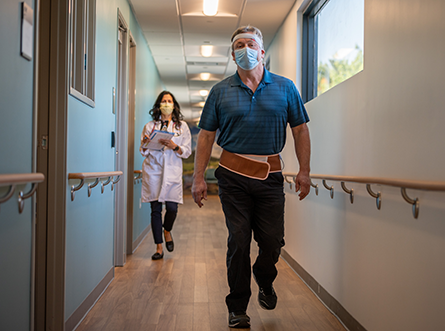People who have long-term COVID-19 symptoms are often called long haulers. It’s estimated that 10-30% of people who had COVID-19 will have long COVID.
UC Davis Health opened the Sacramento region’s first Post-COVID-19 Clinic in October 2020. Here are some things we’ve learned about long COVID since then.
1. Fatigue is the most common long COVID symptom
At UC Davis Health’s Post-COVID-19 Clinic, there are several COVID-19 symptoms that are seen most often. They include:
- fatigue
- depression
- loss of smell
- brain fog
- chest pain
- shortness of breath
The Centers for Disease Control and Prevention (CDC) notes that long haulers can have symptoms that last for weeks or months after infection.
2. Long COVID can affect anyone
While long COVID can affect anyone, it’s mostly seen in people ages 27-54. The clinic has not yet seen any children with severe long COVID symptoms. They’re also not seeing many older people.
Most patients are not obese or diabetic, which are risk factors for more severe COVID-19. Some patients have received the COVID-19 vaccine, while others have not.
3. Women are slightly more likely to develop long COVID
A study using data from the University of California COVID Research Data Set showed about 53% of long COVID patients are female, while 47% are male. The UC Davis Health clinic has seen almost twice as many women as men.
This differs from data on COVID-19 infection, where men are more likely to get the virus. It’s not clear why women seem to be more affected by long COVID.
4. Exercise can help some long haulers
Physicians at the UC Davis Health clinic prescribe heart or lung rehab for some patients who don’t get tired when they exercise. Some patients are hesitant at first because they think it might make their symptoms worse. But most find it helpful. Our physicians see that when patients are pushed, they can usually tolerate more exercise than they thought.
5. COVID-19 vaccine may improve lasting symptoms
Early data from Yale Medicine in 2021 suggested COVID-19 vaccines may help long haulers. However, 10-15% said they felt worse after getting the vaccine. Many patients at the UC Davis Health clinic said they felt better after getting vaccinated.
6. Previous virus may be causing long COVID symptoms
A study published in Cell found that reactivation of the virus that causes mononucleosis (commonly known as mono) was a factor in long COVID. The virus is related to chronic fatigue syndrome. For some people, these symptoms are similar to those who have long COVID.
7. There’s no test to detect long COVID
At this point, there’s no test to determine if someone has long COVID. There’s also no blood test on the market that can determine if COVID-19 is still active in long haulers. Instead, physicians rely on a series of tests to determine the overall health of those with long COVID.
8. Most long haulers get better, but it takes a while
Over the past year, physicians at our long COVID clinic have seen improvements in their patients. The first 15 patients seen at the clinic all had fatigue and shortness of breath. They saw their symptoms improve after seven weeks of training and exercise to strengthen their lungs. About 75% of the patients returned to normal or near normal. For some, it just takes a long time.
9. Our Post-COVID-19 Clinic is exploring other treatments
In addition to exercise, our clinic is looking into treatments like acupuncture, meditation, and special diets. Some of these treatments may help patients with symptoms like fatigue, lack of concentration, and shortness of breath.
Find out more about our Post-COVID-19 Clinic and what we’ve learned




